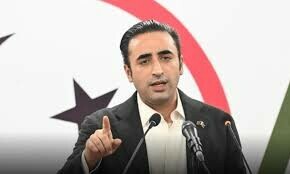 KARACHI, June 16: Sindh Chief Minister Syed Qaim Ali Shah presented on Monday a Rs 267.76 billion budget for 2008-09 in the Sindh Assembly. The budget has an estimated deficit of Rs14 billion, which would be met by improving revenue, by introducing austerity measures and an expected transfer of gas development surcharge from the centre to the province.
KARACHI, June 16: Sindh Chief Minister Syed Qaim Ali Shah presented on Monday a Rs 267.76 billion budget for 2008-09 in the Sindh Assembly. The budget has an estimated deficit of Rs14 billion, which would be met by improving revenue, by introducing austerity measures and an expected transfer of gas development surcharge from the centre to the province.
The budget shows a current revenue expenditure of Rs 180.9 billion and a total development outlay of Rs 77.31 billion.
The development outlay includes provincial ADP of Rs 55 billion, allocation for district governments totaling Rs 12 billion, Drought Emergency Relief Assistance Rs 510 million, Foreign aided projects Rs 4.35 billion, Sindh Devolved Social Services Program Rs 2.73 billion, Sindh Cities Improvement Program Rs 2 billion and other federal grants Rs 12 billion.
The chief minister, who holds the finance, planning and development portfolios, announced withdrawal of 0.1 per cent stamp duty levied in the 2006 finance bill on par value of each electronically transferred share in Karachi Stock Exchange.
He announced an increase of 0.3 per cent on infrastructure cess. The levy is presently 0.5 per cent on imported goods. The finance bill stipulates various slabs for infrastructure cess on imported goods.
“This increase in cess is bound to invite angry statements from the business community, which is groaning under heavy taxation of federal budget,” a business leader said. He recalled that trade bodies had already reacted sharply on sparing stock exchange transaction gains from taxation and putting burden on business.
The Rs180.9 billion revenue expenditure envisages Rs102.99 billion revenue expenditure by the provincial government and Rs77.98 billion by district governments
Qaim Ali Shah said the province would get Rs177.5 billion through transfer of funds from the federal government from the divisible pool of taxes.
“Estimates under oil and gas receipts show negative growth whereas these had been growing at a rate of over 26 per cent in last five tears,’’ complained the chief minister, adding that the matter had been taken up with the federal government.
He, however, disclosed that Sindh’s own revenue collection had shown improvement during the current fiscal year and was being expected at around Rs 30 billion in 2008-09.
Thanks to inflow of loans from the World Bank, Asian Development Bank under various reforms and investment programme, the capital side of budget will show a surplus of Rs 5.5 billion. As against receipts of Rs 14,5 billion, the capital expenditure for 2008-09 is Rs 9.5 billion.
Syed Qaim Ali Shah announced a 20 per cent increase in salaries and pensions of provincial government employees. The additional expenditure will push up the wage bill by Rs 10 billion. The Sindh government already pays Rs 60 billion to 500,000 employees.
The police will be given a grant of Rs 21.3 billion to recruit 3,500 employees and for purchase of vehicles, arms and ammunition. The force would also get one billion rupees to purchase surveillance cameras and equipment.
Since the wages of Sindh police are being brought at par with Punjab police, an additional grant of Rs 570 million has been sanctioned.
Some salient features of the budget are Rs 18.2 billion for water and power, total education budget for province Rs 19.5 billion, health Rs 10.5 billion, water and sanitation Rs 1.12 billion.
The chief minister blamed the previous government for ‘outside budget releases’ totaling Rs 9 billion development and current expenditure side motivated political considerations. “It will be examined how much of this has been irregular expenditure’’, he announced.
In the current fiscal year 2007-08 he said the federal government provided about Rs 3 billion less than indicated Rs 151 billion. The shortfall has come from less collection of federal revenue bureau and in gas development surcharge.
The Chief Minister put Sindh’s share in GDP at 29 per cent.
He said the biggest challenge for his government was poverty.














































Dear visitor, the comments section is undergoing an overhaul and will return soon.